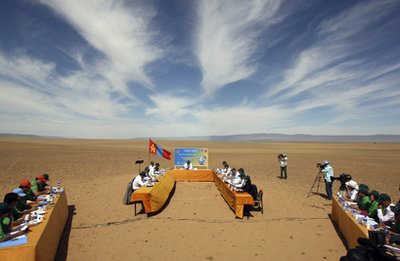蒙古国政府12位部长级官员上周五齐聚在南戈壁省一处被沙漠覆盖的山谷中参加内阁会议,讨论全球气候变化对蒙古国带来的影响。该会议地点距离首都乌兰巴托670公里,所有桌椅都摆在金黄色的沙地上,附近还插了一面蒙古国旗。参会的官员要乘坐吉普车在沙漠中行进15个小时才能到达会议地点,所有官员均穿西装打领带,头戴写有“拯救地球”字样的深绿色棒球帽。在一个小时的会议中,官员们讨论了全球变暖对蒙古国产生的影响,称气候变暖导致的干旱使得该国沙漠化形势日渐严重,而去年冬天的极端恶劣气候也致使该国五分之一的牲畜死亡。官员们希望此举能够引起全世界各国对气候变化的关注,同时期盼11月份在墨西哥召开的气候对话大会能够做出相关决议,在应对气候变化和沙漠化方面对发展中国家提供优惠政策。

 |
|
A Cabinet meeting aimed at drawing attention to climate change is held in Gashuunii Khooloi, a sandy valley in South Gobi province, Mongolia. |
Top Mongolian officials donned dark green baseball caps reading "Save our planet" and set up chairs and tables in the sands of the Gobi desert for a Cabinet meeting aimed at drawing attention to climate change.
The meeting of 12 government ministers was held in scorching heat Friday in Gashuunii Khooloi, a sandy valley in South Gobi province, about 415 miles (670 kilometers) south of Ulan-Bator, the country's capital.
The ministers, dressed in suits and ties, arrived in the desert in jeeps after a 15-hour journey. Officials planted a Mongolian flag in the ground, set up long tables and chairs in the fine, golden sand and discussed climate change against the backdrop of a vast expanse of desert and a bright blue sky.
"Mongolia is feeling the impact of global climate change," Prime Minister Batbold Sukhbaatar said at the one-hour meeting.
Batbold pointed to the recent winter as an example of problems Mongolia faces. The winter was the harshest in decades and a fifth of the country's livestock died.
The government blames global warming for a decrease in rainfall and says that rising average temperatures have caused many rivers and springs to dry up and snow cover to melt. It also says the frequency of natural disasters and drought has jumped.
The site for the meeting was chosen because parts of it used to be arable land, said Badarch, head of social policy for South Gobi province, who like some Mongolians uses only one name.
"Five years ago, there used to grow many edible plants in this valley and there were fewer sand dunes. Now look here," he said. "The valley is completely covered with sand. The sand dunes are moving and taking more space each year."
Minister of Natural Environment and Tourism Gansukh Luumed said Mongolian herders' traditional way of life is under threat. "Global climate change accelerates the desertification process in Mongolia. Currently, 70 percent of Mongolian land is affected by desertification."
In December, Nepalese officials held a Cabinet meeting at Mount Everest to highlight the danger global warming poses to glaciers. It followed an underwater Cabinet meeting in the Maldives in October to underline the threat of rising sea levels.
The government said it hoped that delegates attending global climate talks in Cancun, Mexico, in November would reach a decision that is "favorable for landlocked, developing countries ... very much affected by climate change and desertification."
相关阅读
(Agencies)

(中国日报网英语点津 Helen 编辑)